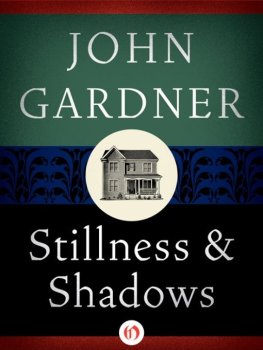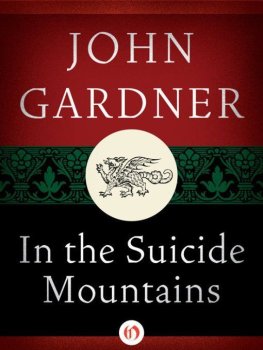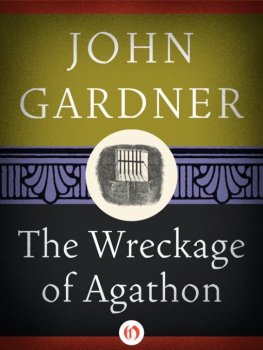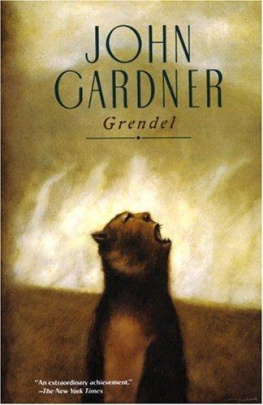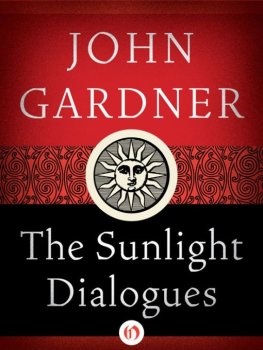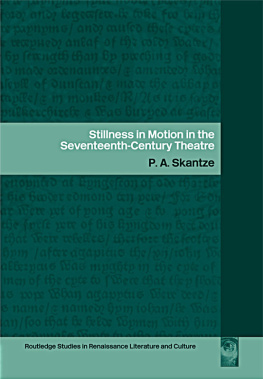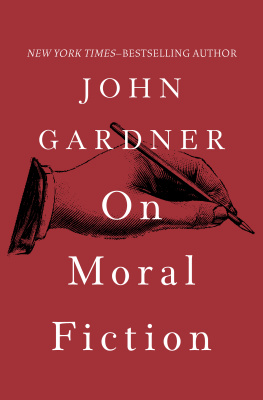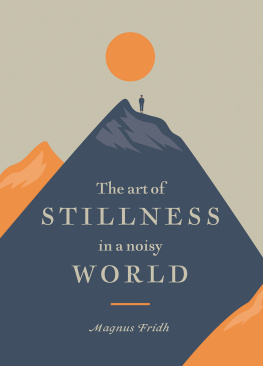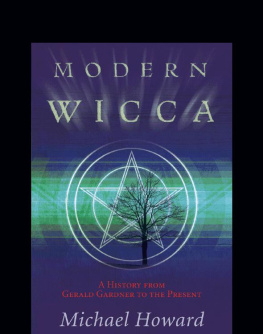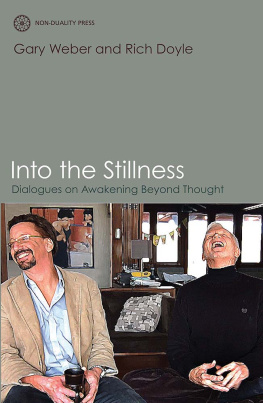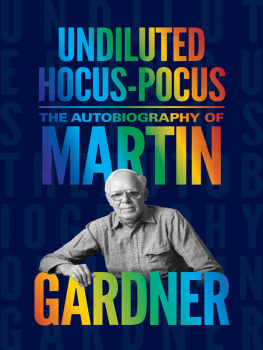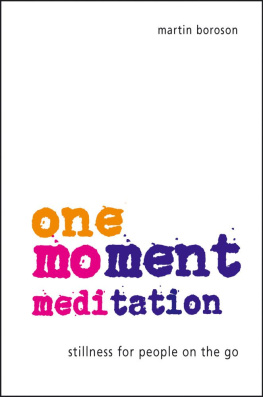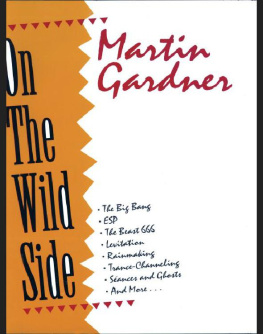John Gardner
Stillness & Shadows
Beauty is momentary in the mind,
The fitful tracing of a portal,
But in the flesh it is immortal.
WALLACE STEVENS
The people are like gnomes, Martin Orrick would write, small and quiet, overmuscular, bearing overlarge heads. As your car drives past, just a few miles from town, they draw up from their work in the steaming bottomlands and stand quietly dangerous, though intending no harm, as still as old stumps or fence posts or deer, watching without expression, their eyes like chips of steel. Toward noon, when the heat of the sun grows unbearable, they sink into the dark wooded hills from which theyre sprung, fall back slyly into the shade of the past; and for a while nothing moves but the circling hawks, an occasional eagle, the ear of a sleeping sow in a thick clump of pokeweed, and, always, the river. Oak trees, sycamores, and pines stand guard, and in the places where houses or trailers lie or places where they once lay maples, tulip poplars, cedars. Drive on, stranger, theres nothing for you here. If everyday humdrum life hides here, if men and women touch with years-old affection, or sing antique songs, or tell stories from their days of railroad building, when a few men made fortunes on apples or coal and the rest worked a lifetime for no better pay than their scars, crooked fingers, and shrewd, creased faces, you will not find it, youll glimpse no smile not prepared with fearful calculation in advance. Here there is no trust. This is a harsh, inhospitable land: even those poor fools who love it are hardly at home on it, cursing its floods and tornadoes, its rust-red, eroding hills, cursing all those whom God saw fit to send more profitable land, yet clinging, for no reason, to this miserable tick- and mosquito-rich place, spawning ground of rattlers, cottonmouths, and copperheads, half the year drowned out by unrelenting rain, half the year dry as a biscuit. This is no place to pause, sink roots: here all things swirl and churn like the river, and the heart finds no rest, no peace, no stillness but the cyclones core. This is a country for gnomes and madmen, a country for the living and dying, not the rich, calm dead.
Useless, as always, to inquire too narrowly what Martin Orrick meant. He was, obviously, one of those poor fools who loved the place the southern Missouri Ozarks, where hed fled from San Francisco in what his psychiatrist would describe, not long afterward, as a desperate attempt to shake the demons from his back, purify his sick heart by fire. That was not how it appeared at the time. He came, one who knew him at the time might have thought, in search of not life but a death worth dying, a death not wan and casual, unfelt. He would gallop his Roman-nosed black stallion through the night, when neither he nor his horse could see his children in their beds, wide-eyed with fear, his beautiful wife indignant and trembling and time after time he would fall and, drunkenly, crawl home. Twice he fractured his skull and, though his brain was his living, showed no remorse. Once, so drunk he could barely stand, he rode off on the bicycle his wife had bought him to keep him off the horse and made ten full miles before he tumbled, bicycle and all, down a twelve-foot embankment and came to rest in a stone-filled branch, where at dawn he awakened, guarded by his whimpering dogs. It was not, of course, the fault of the mountains. In their infinite patience, they could bear up any form of life at all: swift, light deer, sly coon, huge, thoughtful cows, squirrels, rabbits, wolves and foxes, skunks and groundhogs, cross-eyed, old-as-the-hills opossum, who murder young chickens for their sport. He would see the place later as gentle and beautiful, when his eye had changed. What he saw now what he wore flared around him like a wizards cape was suffering, hunger for conclusion: life or death. Old Man Death, in Martin Orricks phrase, was evidently tempted. Again and again he sniffed the wind and came near, then miraculously drew back.
There was a party at the Orricks high-gabled, pillared house, gray under starlight, the security lamp, and the shadow of trees the roof and square tower surrounded like a graveyard by wrought-iron fence, and the hill on which the pretentious, severe old house stood (and the horse-barn, chicken house, smokehouse, and pump house) surrounded by low, shaggy mountains and, in the valley to the east, the silent, wide Mississippi. It was a party for one of Martin Orricks students, who had that day passed her comprehensive exams. Though the house shook with music and light came bursting from every narrow rectangular or round-arched window though cars stood everywhere, glinting like jewels, like the branches, the rooftops, the winter-darkened grass, all thickly cased in ice Death would not be fooled, driven from the place by mere music and light so a stranger with a taste for the gothic might have thought, and Martin Orrick would think before morning. Inside the high door with the fox-head knocker (firewood piled high to the left and right), the ceiling was low, like the roof of a cave, and the dark, crowded furniture sagged and bulged under the weight of slow-talking, slow-gesturing grad students, some of them asleep with their drinks in their hands, some noisily drunk, some asleep but still talking, smoking pot. Useless to try to drive home on that ice. (It had rained all day, then at sunset had suddenly begun to freeze.) It was five miles to town, over Ozark roads. Even the sober might never reach the foot of the driveway.
In the new room, the room that looked out on the pool, Martin Orrick, famous novelist, professor of classical and medieval literature, held forth like a blear-eyed prophet. Joan, his red-headed wife, watched in silence. Shed taken Demerol to kill her pain, such a dose that the world was like a landscape seen through blowing lace, and she suffered, besides, an odd dizziness not usually part of the Demerol high, and a ringing in her ears. She should go to bed, she knew, but she was afraid to. Martin grew, every day, more difficult. If she turned her back, he might suddenly attack some favorite student with cruelty and scorn he would refuse to believe himself guilty of tomorrow, or he might lure some young woman to the storm cellar or the barn or the tower. They would all know, these students who loved him and were always as embarrassed as she was, and helplessly they would watch, pained but not judging, big intelligent grown-ups baffled and hurt and struggling to approve, like children. She had no choice but to prevent it if she could, control him; and sensing her subtle, unspeaking control, he might at any moment turn on her in rage, say terrible things to her, and she, foggy, ringing with that damned, mysterious pain, would be defenseless. They must surely understand that he was mad, simply. Nevertheless it would be she, Joan Orrick, who would be guilty.
Baggy-faced, paunched, standing like a sumo, but icy-eyed, druidic waving his martini and sometimes ferociously driving home a point with a stab of his pipe or the square index finger of his free, dark-red right hand he spoke belligerently of the fall of man. Its a three-part process, he said, or rather fumed, so mean of eye that one might well have imagined or so it seemed to his wife that the man to whom he spoke, half asleep on his feet, his skin splotchy pink, his beard a mass of tangles, was responsible. The ice-crusted trees on the lawn stood motionless, hungrily listening if Martins weird theory of the universe was right and the black, silent river hurried on toward New Orleans, huge helpless mother of animals and men, bearer of St. Louis and Chicago poisons, also treasures of silt, generous feeder of bottomlands, smasher of dikes.
First, he said, and cocked back like a horseman, theres the fall out of Nature, the fall that makes primitive bear cults and corn cults. We kill to eat, and thanks to our consciousness we cant help but notice that in the act of killing we take a step back from the general connectedness, the harmony of Nature, old Schopenhauers universal howl of will: weve judged and condemned brother bear to death, or brother stalk of grain you follow what Im saying? and however our intelligence may deal with the event, the chest the right lobe of the brain, if you like calls it murder and shudders with guilt. His eyes bugged, he spoke so earnestly. He stood with his hand drawn dramatically to his chest. We invent the Corn God, or Artemis-Ursus, and do terrified obeisance, kill virgins to buy our way back in. He was outraged.

